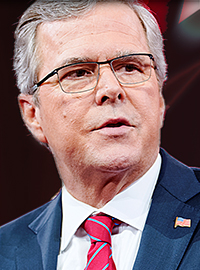| Why Jeb’s Not Catching Fire — And Probably Never Will |
 |
|
By Troy Senik
Thursday, August 20 2015 |
The good news for Jeb Bush is that he’s the perfect candidate for the Republican presidential nomination. The bad news is that he’s the perfect candidate in the year 2000. That’s the counterfactual scenario that most Bush-watchers have spun over the years. Had Jeb won the 1994 race in which he first pursued Florida’s governorship, the theory goes, it would have been him rather than his older brother who became the GOP’s standard-bearer in 2000. Instead, Jeb narrowly lost the ’94 race to Democrat Lawton Chiles, George W. won his contest in Texas in the same year and the younger sibling looked on six years later as his brother ascended to the White House. That historical twist may have permanently thwarted Jeb’s White House aspirations. It’s not just that the American people are inherently resistant to the dynastic impulse that would see three consecutive members of the Bush family serve as Republican presidents. It’s also that the legacy of Jeb’s family has ineluctably changed the dynamics within the GOP. To understand the principle at work here, you have to recall that Jeb’s father, George H.W. Bush, was long regarded as an interloper by movement conservatives. Indeed, it was Bush 41 who coined the phrase “voodoo economics” as a criticism of Ronald Reagan’s economic policy and who pledged a “kinder, gentler America” in the wake of Reagan’s presidency (a promise that prompted Nancy Reagan to reply “Kinder than who?”). For the conservative base, the elder Bush was a man not to be trusted,a principle only reaffirmed by the violation of his “Read my lips: no new taxes” pledge. George W. Bush may have done a more thoroughgoing job of ingratiating himself to the right prior to taking up residency in the Oval Office, but by the time he departed office eight years later, many conservatives were starting to feel like they had been taken for a ride again. The younger Bush had dramatically increased federal spending, presided over a government bailout of the financial sector and pushed through an unfunded entitlement expansion. Indeed, though it’s often forgotten now, the Tea Party movement arose just as much in reaction to the “big government conservatism” of President Bush and a Republican congress as it did to the excesses of Barack Obama. Where the Bush family is concerned, many conservatives have now taken on the mindset of “Fool me once, shame on you; fool me twice, shame on me.” All of that means that Jeb Bush has a tougher row to hoe than any other candidate in the Republican field: He’s essentially saddled with defending three people’s records instead of one. And it doesn’t help matters any that on two of Bush’s signature issues — immigration and Common Core education standards — he’s advocating policies that make the conservative base deeply uncomfortable. Here’s the irony: Take a close look at Bush’s record in Tallahassee — not to mention decades worth of writing, speeches and interviews — and you’ll discover a man far more in touch with movement conservatism than either his father or his brother. What undermines all of that, however, is the rhetorical notes the former governor has struck throughout the campaign: claiming that he’s ready to “lose the primary to win the general”; describing illegal immigration as an “act of love”; referring to his own immigration prescription as “the grown-up plan.” Fairly or not, many conservatives find in those words an implicit indication that Governor Bush isn’t especially fond of them; that they’re little more than an obstacle he has to overcome on the road to the White House. This, of course, is not necessarily fatal for a Republican presidential candidate. Indeed, both John McCain and Mitt Romney faced similar hurdles prior to earning their party’s nominations. There’s one big difference this time, however: the competition. Romney triumphed over one of the weakest Republican presidential fields in recent memory. McCain shot to the nomination after Rudy Giuliani and Fred Thompson had flamed out, with neither Romney nor Mike Huckabee commanding wide enough popularity to give him a serious run for his money. Bush doesn’t have that luxury. Facing the likes of Marco Rubio, Scott Walker, Ted Cruz, John Kasich and literally a dozen others, he’ll have to do something more than fatiguing voters into submission. The Jeb Bush campaign isn’t based on passion, inspiration or enthusiasm. It’s based on being just good enough for conservatives to reluctantly give in. In most years — and with most fields — that strategy would have a decent shot at working. But not in 2016. For the second time in his career, Jeb Bush is likely to become a victim of terrible timing. |
Related Articles : |
























